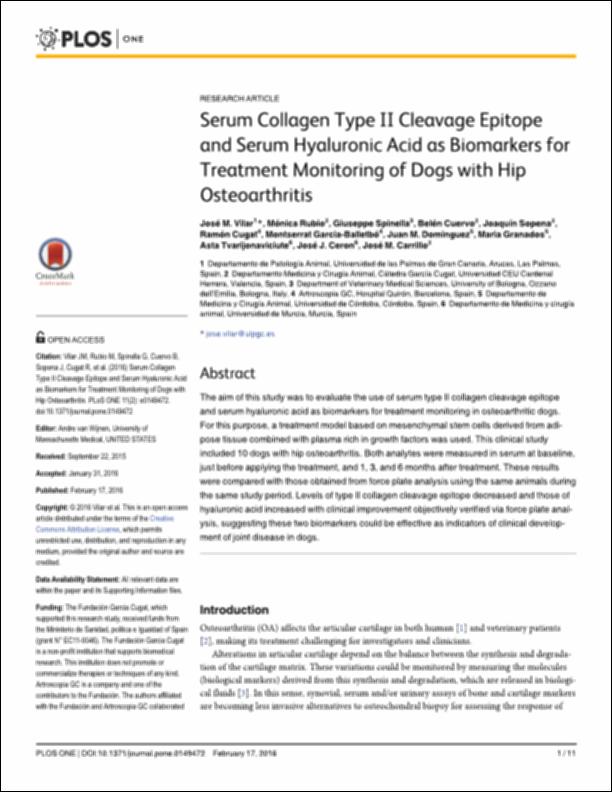Por favor, use este identificador para citar o enlazar este ítem:
http://hdl.handle.net/10637/10602Serum collagen Type II cleavage epitope and serum hyaluronic acid as biomarkers for treatment monitoring of dogs with hip osteoarthritis
| Título : | Serum collagen Type II cleavage epitope and serum hyaluronic acid as biomarkers for treatment monitoring of dogs with hip osteoarthritis |
| Autor : | Vilar, José M. Rubio Zaragoza, Mónica. Spinella, Giuseppe Cuervo Serrato, Belén Sopena Juncosa, Joaquín Jesús. Cugat Bertomeu, Ramón García Balletbó, Montserrat Domínguez Pérez, Juan Manuel Granados Machuca, María del Mar Tvarijonaviciute, Asta Cerón Madrigal, José Joaquín Carrillo Poveda, José María. |
| Materias: | Hyaluronic acid - Therapeutic use.; Articulaciones - Enfermedades - Tratamiento.; Joints - Diseases - Treatment.; Células madre - Uso terapéutico.; Stem cells - Therapeutic use.; Ácido hialurónico - Uso terapéutico.; Growth factors - Therapeutic use.; Perros - Locomoción.; Dogs - Locomotion.; Osteoartritis en los perros - Tratamiento.; Osteoarthritis in dogs - Treatment.; Crecimiento - Factores - Uso terapéutico. |
| Editorial : | PLOS. |
| Citación : | Vilar, JM., Rubio, M., Spinella, G., Cuervo, J., Sopena, J., Cugat, R. et al.(2016). Serum collagen Type II cleavage epitope and serum hyaluronic acid as biomarkers for treatment monitoring of dogs with hip osteoarthritis. PLoS ONE, vol. 11, n. 2 (17 feb. 2016), art. e0149472. DOI: https://doi.org/10.1371/journal.pone.0149472 |
| Resumen : | The aim of this study was to evaluate the use of serum type II collagen cleavage epitope and serum hyaluronic acid as biomarkers for treatment monitoring in osteoarthritic dogs. For this purpose, a treatment model based on mesenchymal stem cells derived from adipose tissue combined with plasma rich in growth factors was used. This clinical study included 10 dogs with hip osteoarthritis. Both analytes were measured in serum at baseline, just before applying the treatment, and 1, 3, and 6 months after treatment. These results were compared with those obtained from force plate analysis using the same animals during the same study period. Levels of type II collagen cleavage epitope decreased and those of hyaluronic acid increased with clinical improvement objectively verified via force plate analysis, suggesting these two biomarkers could be effective as indicators of clinical development of joint disease in dogs. |
| Descripción : | Este artículo se encuentra disponible en la siguiente URL: https://journals.plos.org/plosone/article?id=10.1371/journal.pone.0149472 |
| URI : | http://hdl.handle.net/10637/10602 |
| Derechos: | http://creativecommons.org/licenses/by/4.0/deed.es |
| ISSN : | 1932-6203 (Electrónico) |
| Fecha de publicación : | 17-feb-2016 |
| Centro : | Universidad Cardenal Herrera-CEU |
| Aparece en las colecciones: | Dpto. Medicina y Cirugía Animal |
Los ítems de DSpace están protegidos por copyright, con todos los derechos reservados, a menos que se indique lo contrario.


